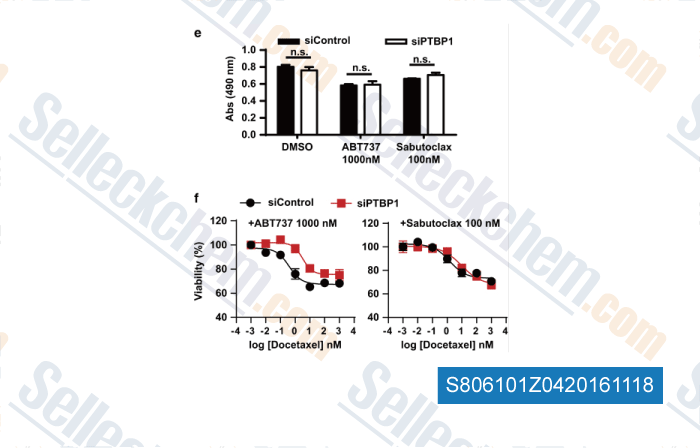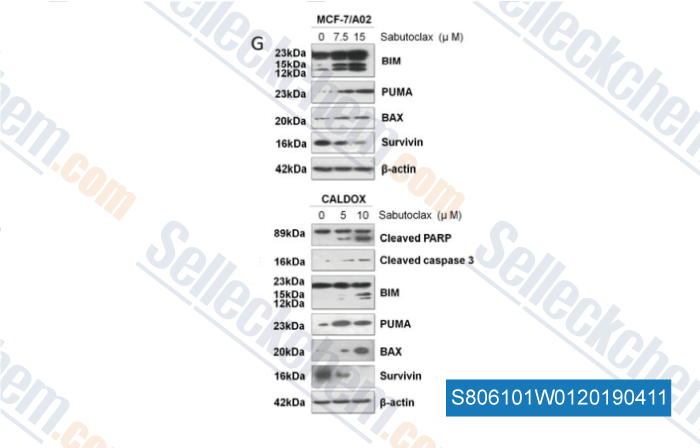|
How to Cite 1. For In-Text Citation (Materials & Methods): 2. For Key Resources Table: |
||
|
Toll Free: (877) 796-6397 -- USA and Canada only -- |
Fax: +1-832-582-8590 Orders: +1-832-582-8158 |
Tech Support: +1-832-582-8158 Ext:3 Please provide your Order Number in the email. We strive to reply to |
Technical Data
| Formula | C42H40N2O8 |
||||||||||||||
| Molecular Weight | 700.78 | CAS No. | 1228108-65-3 | ||||||||||||
| Solubility (25°C)* | In vitro | DMSO | 100 mg/mL (142.69 mM) | ||||||||||||
| Ethanol | 25 mg/mL (35.67 mM) | ||||||||||||||
| Water | Insoluble | ||||||||||||||
| In vivo (Add solvents to the product individually and in order) |
|
||||||||||||||
|
* <1 mg/ml means slightly soluble or insoluble. * Please note that Selleck tests the solubility of all compounds in-house, and the actual solubility may differ slightly from published values. This is normal and is due to slight batch-to-batch variations. * Room temperature shipping (Stability testing shows this product can be shipped without any cooling measures.) |
|||||||||||||||
Preparing Stock Solutions
Biological Activity
| Description | Sabutoclax (BI-97C1) is a pan-Bcl-2 inhibitor, including Bcl-xL, Bcl-2, Mcl-1 and Bfl-1 with IC50 of 0.31 μM, 0.32 μM, 0.20 μM and 0.62 μM, respectively. | ||||||||
|---|---|---|---|---|---|---|---|---|---|
| Targets |
|
||||||||
| In vitro | BI-97C1 potently inhibits cell growth of human prostate cancer, lung cancer, and lymphoma cell lines with EC50 values of 0.13, 0.56, and 0.049 μM, respectively, and shows little cytotoxicity against bax-/-bak-/- cells[1]. It is suggest that treatment with the combination regimen of mda-7/IL-24 and BI-97C1 induces autophagy that facilitates apoptosis in association with up-regulation of NOXA, accumulation of Bim, and activation of Bax and Bak[2]. |
||||||||
| In vivo | BI-97C1 displays in vivo efficacy in transgenic mice in which Bcl-2 is overexpressed in splenic B-cells and also demonstrates superior single-agent antitumor efficacy in a prostate cancer mouse xenograft model that depends on Mcl-1 for survival[1]. Treatment with Ad.5/3-mda-7 and BI-97C1 significantly inhibits the growth of human PC xenografts in nude mice and spontaneously induced PC in Hi-myc transgenic mice. Tumor growth inhibition correlats with increased TUNEL staining and decreased Ki-67 expression in both PC xenografts and prostates of Hi-myc mice[2]. |
Protocol (from reference)
| Kinase Assay: |
|
|---|---|
| Cell Assay: |
|
| Animal Study: |
|
References
|
Customer Product Validation

-
Data from [ , , Cell Death Differ, 2016, 23(10):1681-90. ]

-
Data from [ , , Cancer Lett, 2018, 423:47-59 ]
Selleck's Sabutoclax Has Been Cited by 11 Publications
| Obatoclax Rescues FUS-ALS Phenotypes in iPSC-Derived Neurons by Inducing Autophagy [ Cells, 2023, 12(18)2247] | PubMed: 37759469 |
| Obatoclax Rescues FUS-ALS Phenotypes in iPSC-Derived Neurons by Inducing Autophagy [ Cells, 2023, 10.3390/cells12182247] | PubMed: 37759469 |
| Identification of bicyclic compounds that act as dual inhibitors of Bcl-2 and Mcl-1 [ Mol Divers, 2022, 10.1007/s11030-022-10494-6] | PubMed: 35909144 |
| Comparison of putative BH3 mimetics AT-101, HA14-1, sabutoclax and TW-37 with ABT-737 in platelets. [ Platelets, 2020, 10.1080/09537104.2020.1724276] | PubMed: 32079453 |
| Alveolar Macrophage Apoptosis-associated Bacterial Killing Helps Prevent Murine Pneumonia. [ Am J Respir Crit Care Med, 2019, 200(1):84-97] | PubMed: 30649895 |
| Targeting CDK6 and BCL2 Exploits the "MYB Addiction" of Ph+ Acute Lymphoblastic Leukemia [De Dominici M, et al. Cancer Res, 2018, 78(4):1097-1109] | PubMed: 29233926 |
| Sabutoclax, pan-active BCL-2 protein family antagonist, overcomes drug resistance and eliminates cancer stem cells in breast cancer [Hu Y, et al. Cancer Lett, 2018, 423:47-59] | PubMed: 29496539 |
| PPARγ is critical forMycobacterium tuberculosisinduction of Mcl-1 and limitation of human macrophage apoptosis [ PLoS pathogens, 2018, 14(6): e1007100.] | PubMed: None |
| PPARγ is critical for Mycobacterium tuberculosis induction of Mcl-1 and limitation of human macrophage apoptosis. [ PLoS Pathog, 2018, 14(6):e1007100] | PubMed: 29928066 |
| PTBP1 modulation of MCL1 expression regulates cellular apoptosis induced by antitubulin chemotherapeutics [Cui J, et al. Cell Death Differ, 2016, 23(10):1681-90] | PubMed: 27367564 |
RETURN POLICY
Selleck Chemical’s Unconditional Return Policy ensures a smooth online shopping experience for our customers. If you are in any way unsatisfied with your purchase, you may return any item(s) within 7 days of receiving it. In the event of product quality issues, either protocol related or product related problems, you may return any item(s) within 365 days from the original purchase date. Please follow the instructions below when returning products.
SHIPPING AND STORAGE
Selleck products are transported at room temperature. If you receive the product at room temperature, please rest assured, the Selleck Quality Inspection Department has conducted experiments to verify that the normal temperature placement of one month will not affect the biological activity of powder products. After collecting, please store the product according to the requirements described in the datasheet. Most Selleck products are stable under the recommended conditions.
NOT FOR HUMAN, VETERINARY DIAGNOSTIC OR THERAPEUTIC USE.
